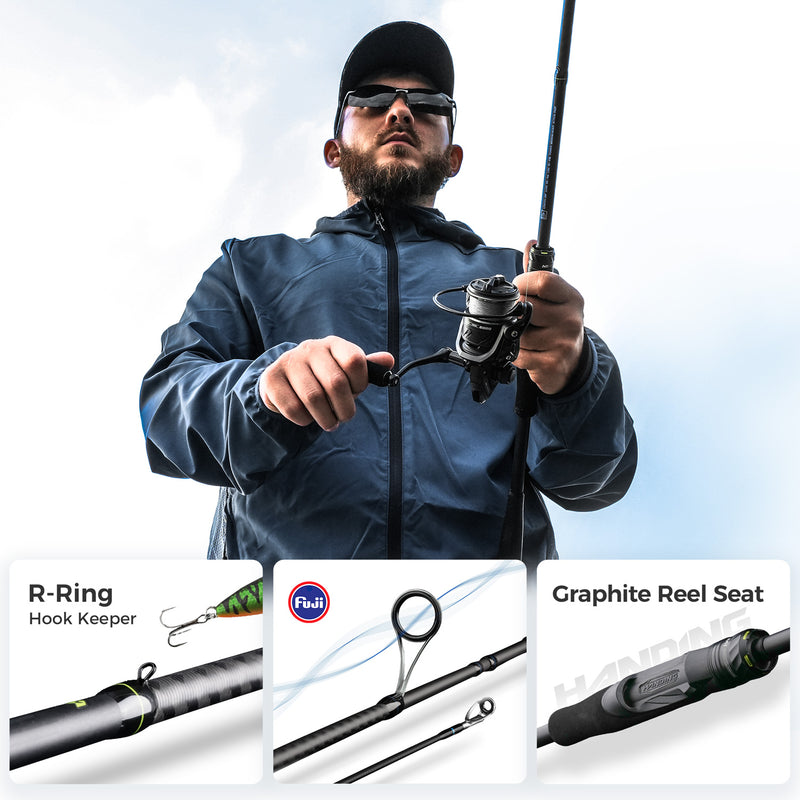Unlock the Secrets: Discover the Perfect Fishing Rod for Your Next Adventure!
Fishing is more than just a pastime; it's an adventure that connects us to nature and offers an escape from our daily routines. At the heart of every successful fishing expedition lies the fishing rod, a crucial tool that can make all the difference in your experience. With a multitude of options available, from lightweight spinning rods to robust baitcasting rods, selecting the right fishing rod is essential based on your personal preferences and fishing style. Whether you're a seasoned angler or a novice just starting, understanding the unique characteristics of different fishing rods will enhance your angling adventures and help you reel in that trophy catch.

Understanding Different Types of Fishing Rods
Fishing rods come in various types, each designed for specific fishing techniques and environments. Spinning rods are among the most popular due to their versatility; they are typically lighter and easier to handle, making them ideal for beginners. These rods are designed for use with spinning reels and are perfect for casting lightweight lures or baits. Baitcasting rods, on the other hand, offer more precision and control, making them suitable for experienced anglers targeting larger species. They feature a revolving spool that allows for smoother casting, but require some skill to master.
Fly rods are designed specifically for fly fishing, with a longer and more flexible design that allows for delicate presentations of the bait. These rods are perfect for targeting species like trout or salmon in freshwater streams. Other types include telescopic rods, which are compact and portable, making them great for travel, and surf rods, designed for fishing from the beach into the ocean. Each type has its unique features, catering to specific fishing scenarios, so it's important to choose one that aligns with your fishing style.
Key Features to Consider When Choosing a Fishing Rod
When selecting a fishing rod, there are several key features to consider that can significantly impact your fishing performance. Length is one of the most crucial factors; longer rods provide increased casting distance, while shorter rods offer more control. Action refers to how much the rod bends when pressure is applied, with fast action rods bending near the tip and slow action rods bending closer to the handle. This affects sensitivity and control, which is vital when you're trying to feel a bite.
Power indicates the rod's strength, categorized from ultra-light to heavy, affecting what species you can target. Material also plays an important role; graphite rods are lightweight and sensitive, while fiberglass rods are more durable and flexible. Lastly, the grip of the rod should feel comfortable in your hand, as you'll be holding it for extended periods. Understanding these features will guide you in selecting a rod that fits your needs and enhances your fishing experience.
Matching the Rod to Your Fishing Style
Matching your fishing rod to your specific fishing style can significantly improve your success on the water. For instance, if you're planning to fish in freshwater, a medium to light spinning rod is often the best choice for targeting species like bass or trout. Conversely, if you're venturing into saltwater, a heavier baitcasting or surf rod may be necessary to handle larger fish and the challenging conditions of the ocean.
Shore fishing typically benefits from longer rods that can cast further into the water, while boat fishing may allow for shorter rods that provide better control when reeling in fish. For novice anglers, it’s beneficial to start with a versatile spinning rod that can be used in various situations, and as you gain experience, you can explore specialized rods for specific techniques. Remember, the right match between rod and fishing style not only increases your chances of success but also enhances your overall enjoyment of the sport.
Maintaining Your Fishing Rod
Proper care and maintenance of your fishing rod are essential to ensure its longevity and performance. After each fishing trip, it's a good practice to rinse your rod with fresh water to remove any salt, dirt, or debris that may have accumulated. Pay special attention to the guides and reel seat, as these areas can trap sand and other particles that could cause damage over time.
Additionally, store your rod in a protective case or rod holder to avoid bending or breaking. If you notice any signs of wear on the guides or rod itself, it’s wise to address these issues promptly to prevent further damage. With just a little effort in maintenance, you can keep your fishing rod in top shape for many seasons to come.
Enhancing Your Fishing Experience
Choosing the right fishing rod is a vital aspect of enhancing your fishing experience. With a diverse range of types and features available, understanding each option allows you to make an informed decision that aligns with your fishing style and preferences. From spinning rods to fly rods and everything in between, the right rod can significantly increase your chances of landing that elusive catch while making your time on the water more enjoyable. So, take the time to explore your options, match your rod to your fishing adventures, and get ready to unlock the secrets of successful fishing!








